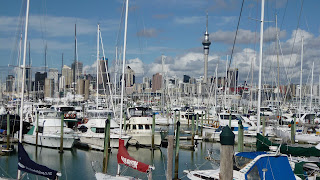
This is a special tour. The photos are a remix, I just work the commentary for a submission for a course I am doing. This is meant to be a teaching document for Primary school. That is why the language is simple.A tour like this will change your thinking.
Ngarimu, the leader of Zero-waste.

Celebrating
Waitangi Day with a difference
On the day before Waitangi day, I go to the Ngati Whatua Marae at Bastion Point.
There are people from all over the world. They come from
Japan, China, Vietnam, Germany, England, Sweden and many other countries. We
are volunteers. Volunteers mean we do jobs without being paid.
We wait at the steps outside the Public Relations office.
They tell us the customs of the Marae.
To give respect, we must take our shoes off outside the Marae. We must not take photos inside, because there are spirits if
their ancestors.Before we go into the Marae
compound, they have a Powhiri to
welcome us.
We sit on the mattress on the floor, and listen to the Maori
elders tell us the Maori custom. Then we listen to Jo Knight of the Zero-Waste
Trust. They tell us how important it is to recycle and not ruin our Mother
Earth. After the talks, we walk in a row and we do the Hongi. To many foreigners, this is an interesting experience.
We move to the dining hall, and they fed us with big portions
of vegetarian food. It was very tasty.
We go to sleep on the floor. All the mattresses are place
next to each other. You sleep with strangers.
The men are asked to help in the Hangi. I have never seen a Hangi.
I was interested to look. They dig a hole in the ground. They used burnt cider
in the ground. They put pork, potatoes, kumara, and pumpkins. It takes many hours. The food is not for us,
they sell it at the Waitangi celebrations.
It is hard to sleep with 100 people inside. Some people talk.
Some people snore.
We wake up at 6 am so we can use the bathroom first. I go for
a walk. The sun rise is beautiful.
We have breakfast. We are given a cowboy hat and T-Shirts.
The T-shirts tell the festival goers that we are the Zero-waste workers.
We take our big wheeling bins down the slope to the Orakei Park.
That was hard.
We go to our station. We are to educate or tell people what
is Zero-waste? We have one big bin for all recycle stuff like paper, plastic
bottles; one medium bin for Kai. Kai means food, food for the worms. And a little
plastic bag for the landfill.
We are supposed to be there only to tell the people which bin
to drop their rubbish. But some people just drop their rubbish and walk away
very quickly. We have to bend over to get the wrong things. “Not nice”
It’s hot. Standing there the whole day is very tiring. They
give us lots of water, and yummy food. We hear the nice music.
One year, they had the boats to welcome the VIP. VIP means
very important people. There was Powhiri.
They do the Kapa Haka.
When most of the festival goers have gone, I go to the “back-end”
to help out. I thought standing at my station was bad, this is
awful. When people do not listen to instructions, they dump everything in the
wrong bin, we have to sort them. When food is left out in the hot sun for many
hours, it is not nice, the smell changes. Someone jokes that we should ban
disposable nappies.
Why do we do it? At the end of the festival, the Orakei Park
was very clean. It was free of rubbish. Instead of dumping to the landfill, we
diverted 79% (4.9 tonnes) to worm farms and recycling. I am more conscious
about recycling.
I go back every year. The Maori leader said, “You slept in
our Marae, you ate our food, you are
now a Maori, you belong to the Whanau of
Ngati Whatua”
I am glad to be a
friend of Ngarimu Blair. He works very
hard and I am glad he won a Sir Peter Blake award for his work on behalf of the
Ngati Whatua o Orakei.
Purpose:
You learn about recycling and some Maori customs.
Vocabulary: New Zealand Theme words.
Marae, powhirei Kapa
Haka, Hanhgi. Hongi, whanau, kai
Public relations, landfill, ancestors, festival, VIP,
volunteers
link to Mr Linky at the Friday shoot out link below.


 retail price NZ$35 http://annkitsuetchin.blogspot.com/2011/02/who-is-ann-kit-suet-chin.html
retail price NZ$35 http://annkitsuetchin.blogspot.com/2011/02/who-is-ann-kit-suet-chin.html










































